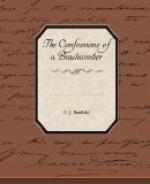Well, the life of a settler—the man who drags his sustenance, all and every part of it, from the soil in tropical Queensland, as a mere settler very closely resembles that of others who cultivate. If an abstract of the universal experience were obtainable, it would very likely be found to go towards the establishment of a standard from which many would cheerfully desire many cheerful changes. After all, that represents a condition not altogether monopolised by settlers.
Yet, when once the life is begun, how few there are who attempt to withdraw from it? It grows on the senses and faculties. It appeals to the emotional as well as to the stolid humours. The cares of this world as expounded in town life, and the sinfulness of never-to-be-acquired riches are foreign to the free, bland air which has filtered through the myriad leaves of the mountain, and which smacks so strongly of freedom. Sometimes the settler takes up studies and relieves the sameness of his duties by pastimes. One never went to his maize field, along narrow gloomy aisles through the jungle, without a net for the capture of butterflies. His humble home was as resplendent as the show-cases of a natural history museum. But he was singularly favoured. A lovely waterfall was the jewel on his estate. That was the shape of beauty that moved away the pall from his dark spirit and gave colour to his life and actions. Another took to collecting birds’ eggs; another to the study of botany; another to photography. Each wreathed, according to his predilections, a flowery band to bind him to the earth, finding that even the life of a settler may be filled with “sweet dreams, and health and quiet.” But the great majority seem to have taken to the scrap heap of Federal politics with such ardour that they clutch but the fag ends of the poetry of life.
Many become great readers and are knowing and knowledgeable. Those who drift away from country life are for the most part men who hustle after the coy damsel fortune by searching for minerals, and just as many who have succeeded in that arduous passion settle quietly on the land. Each may and does desire amendments to and amelioration in his lot. There is still left to all the healthy impulse of achievement, the desire for something better, the noble and inspiriting virtue of discontent.
Rare is a deserted home. Even the first rough dwelling of a settler possessing the slenderest resources is invested with tender sentiments. There is his home—a poor one, perhaps, but his own, and to it he clings with desperation, sees in and about it attractions and beauty where others perceive nothing but untoned dreariness, unrelieved hopelessness. His little bit of country may be remote and isolated, but Nature is warm and encouraging, and profuse of her stimulants here. She responds off-hand without pausing to reflect, but with an outburst of goodwill and purpose to appeals for sustenance. She has no despondent moods. She never lapses in prolific




